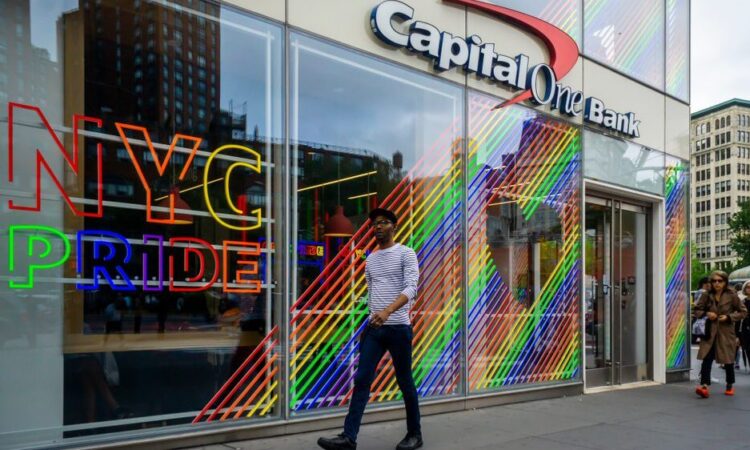
Nigel Farage’s ‘de-banking’ scandal is just the tip of the iceberg and points to a much wider practice of banks cosying up to woke ideology and prioritising certain ideological beliefs over profit maximisation and the interests of clients.
As we previously reported, the British private bank Coutts closed the account of Nigel Farage, the former leader of the UK Independence Party (UKIP) on political grounds, citing his views on Brexit, Donald Trump, immigration, and LGBT issues, and for not supporting the “diversity, policies and ‘purpose’ of Coutts.” In the wake of the scandal, Dame Alison Rose resigned as the boss of NatWest, the holding company which owns Coutts, after she admittedly leaked false information to the BBC on Nigel Farage’s bank records.
As an article in The Telegraph last week pointed out, Dame Alison Rose is the embodiment of everything that’s wrong with global banks these days. “Tackling the climate emergency is one of, if not the biggest issue of our time—and banks have a massive role to play in mobilising the power of finance to meet the net zero ambition,” she announced after becoming the first female chief executive of Natwest Group—and sure enough, on that very same day, the bank ended new loans for oil and gas extraction. “Just what that had to do with banking is anyone’s guess. This may point to the deeper problem: Dame Alison had been led to believe that getting ahead in banking now meant following a political agenda,” commented The Spectator.
Politically held beliefs have a part to play in the British defence industry’s problems with accessing banking services. As the Daily Express wrote a few weeks ago, bosses of small defence businesses claim they have been refused accounts, insurance, or denied capital loans, all in the name of so-called ESG (environmental, social, and governance) policies, that prioritise long-term environmental and social sustainability when making investments. “I’m sure these bankers will be more than happy to read out their codes of ethics to Russian forces as they land on our beaches,” said Labour MP Kevan Jones, former Shadow Minister for the Armed Forces. The Ministry of Defence launched an investigation into the matter and warned that the defence industry is needed to keep the nation safe.
Members of staff are “bullied into compliance with these ‘progressive’ edicts,” a former senior banker at Coutts told The Telegraph, stating the bank would “genuinely rather have a less qualified ethnic minority who can’t even compose an email to the clients because it helps with their ESG Rating.” Woke ideology has taken hold of other financial groups too. As ITV reported, Halifax Bank told customers to close their accounts “if you disagree with our values.” This happened after customers complained about the bank’s decision to include pronouns on staff name tags.
Yorkshire Building Society closed a priest’s account because he disagreed with their promotion of transgender ideology during Pride month. “Behind the rainbow flags and pronoun badges lies a ruthless authoritarianism,” commented Spiked magazine. Yet British account owners don’t seem to want social issues to be involved with banking decisions. According to a Jobs Foundation poll, cited by the British newspaper i, 31% of Britons think businesses should focus on jobs, 30% on paying taxes, and 22% on training staff. Only 21% named zero carbon emissions as a top priority for businesses to strive for while campaigning for social issues was mentioned by 1%. “The preoccupations of many business leaders are far away from what they purportedly exist to do: create wealth and jobs,” commented the newspaper.
The same can be said of banks doing business in the US. In May, Florida Gov. Ron DeSantis signed into law a bill barring state officials from investing public money to promote environmental, social, and governance goals. “Corporate power has increasingly been utilised to impose an ideological agenda on the American people through the perversion of financial investment priorities under the euphemistic banners of environmental, social, and corporate governance and diversity, inclusion, and equity,” emphasised DeSantis, who is running for President on a Republican ticket in next year’s presidential primaries. Florida hasn’t actually banned ESG but made sure that financial interests were prioritised over other considerations.
Earlier this year, a coalition of 21 state attorneys general sent a letter to 53 of the USA’s largest financial institutions warning them against pursuing woke environmental and social initiatives, otherwise they would take legal action. “You have a fiduciary obligation under our various states’ laws to maximise investment. That’s your job,” Montana Attorney General Austin Knudsen told Fox News. Oklahoma was one of the states to act fast, banning 13 major financial institutions, including BlackRock, Wells Fargo, JPMorgan Chase, and Bank of America from doing business with the state after a review determined the banks engaged in energy boycotts. “The energy sector is crucial to Oklahoma’s economy, providing jobs for our residents and helping drive economic growth”, Oklahoma State Treasurer Todd Russ said in a statement.
Republican politicians also pointed out how woke ideology played a part in the downfall of Silicon Valley Bank (SVB) earlier this year. Although experts believe poor investment strategies were the main cause of the Californian bank’s demise, the company’s head of risk management at the bank’s UK branch did spend a considerable amount of time on LGBT programs, wrote the New York Post. Jay Ersapah launched initiatives such as the company’s first month-long Pride campaign and a blog emphasising mental health awareness for LGBT youth. “SVB is what happens when you push a leftist/woke ideology and have that take precedent over common sense business practices,” tweeted Donald Trump Jr., son of the former President.
Stephen Miller, a former senior adviser to President Trump, questioned “how many hours & dollars were spent on equity/DEI/ESG/climate scams.”





